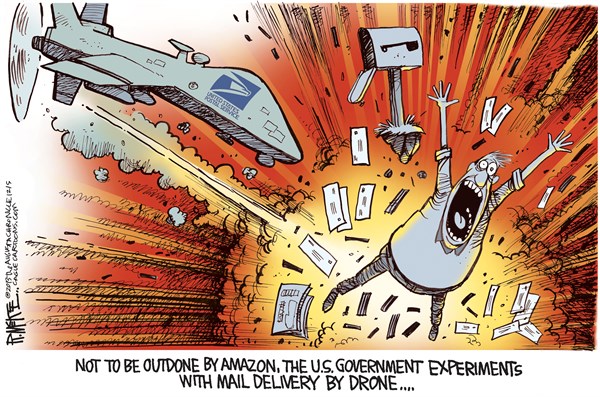
Although drones seem to be in wide use elsewhere, the Federal Aviation Administration is nervous about letting U.S. skies fill up with them, citing safety and privacy concerns.
The FAA already fined a photographer $10,000 for taking commercial pictures of a university by drone. It was overturned in court, but the FAA is appealing the decision. The FAA has approved use of drones for law enforcement officers and firefighting but insists these are highly regulated and restricted.
Meanwhile, real estate agents are having a field day, literally, flying drones over houses to show buyers a different perspective, ignoring the fact that this is against the law. The Des Moines Register found a number of realtors who use drones they make themselves, ignoring a recommendation by the National Association of Realtors that drones not be used until the FAA approves them.
Now, farmers want to use drones to check their crops. A company in Maryland is getting ready to sell them despite their illegality.
Amazon head Jeff Bezos says he foresees the day when an Amazon order is delivered in 30 minutes by drone. Up in the sky! It's a bird. It's a plane. No, it's the "Divergent" series from Amazon. He has teamed up with three drone manufacturers to lobby for government permission.
Those less-than-reputable journalists who try to invade private weddings, bar mitzvahs and celebrity birthday parties would love to use drones anywhere they want to get pictures.
Film producers see great potential in using drones to get aerial shots with far less cost and risk.
Not so fast, say U. S. regulators, including the FAA and Department of Transportation. Who would be licensed to use drones? What training would be required? How would commercial planes avoid them? So far drones are unable to detect and avoid other flying objects. Who's responsible if my drone hits your drone? What about Peeping-Tom drones?
Not surprisingly, there is a trade association that now represents military and civil drone manufacturers. The Association for Unmanned Vehicle Systems International is lobbying for clear and lenient regulations.
Congress wants regulations ready by September 2015. But nobody expects that deadline to be met. Most think regulations won't be enforceable for months, if not years. The FAA, however, has suggested there could be 7,500 licensed drones in the United States by 2018 and is testing drones in six states.
In Europe, progress is much faster. Also, the U.S. military has no qualms about bombing terrorist targets using drones, which has convinced some foreigners that all Americans are drone-crazy. But Canada, Australia, Japan and the United Kingdom are far ahead of the U.S. in commercial drone use. Last year Transport Canada, a regulatory body, issued 1,000 non-military permits for drones.
The U.S. has issued one commercial air permit, in June, giving BP authority to use drones in its oil operations in Alaska for five years. (Yet another indication that despite BP's polluting of the Gulf, the government usually bends over backward for the company.) (A 2013 permit to ConocoPhillips was to scan the seabed.)
While American hobbyists fly drones (not near airports or higher than 400 feet), most Americans seem to be leery of weird unidentified objects buzzing over their heads.
A recent drone industry conference in Washington drew forth no expectation that widespread commercial use of drones is arriving anytime soon. In fact, it will be years, according to United Nations officials.
The other day my mother wanted to watch "Gone with the Wind" in honor of its 75th anniversary. She enjoyed the anticipation of waiting for her DVD to arrive two days later and had a pleasant conversation with the mail carrier who delivered it. She didn't have to scan the skies waiting for it to fall on her doorstep.
Comment by clicking here.
Ann McFeatters is an op-ed columnist for McClatchy-Tribune.



 Contact The Editor
Contact The Editor
 Articles By This Author
Articles By This Author